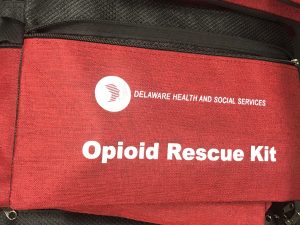MILLSBORO — In response to six suspected overdose deaths, including four in Sussex County, that occurred over the holiday weekend, the Division of Public Health (DPH) will hold a Community Naloxone Training and Distribution event in Millsboro on Friday, Sept. 6, 2019. DPH will distribute free naloxone kits to members of the public from 10 a.m. to 2 p.m. at Millsboro Fire Company, 109 East State St., Millsboro, DE 19966.
Each kit contains two doses of naloxone, and members of the community who attend these events will receive one-on-one training on how to administer the overdose-reversing medication. The Division of Substance Abuse and Mental Health (DSAMH) will also have representatives on hand to answer any questions about access to treatment for those struggling with substance use disorder. 
“We know that 80 percent of overdoses happen in a residence,” said DPH Director Dr. Karyl Rattay. “If family or friends of someone overdosing have naloxone immediately accessible, it can mean the difference between life or death for that person. We urge anyone who might ever have a need for access to naloxone to attend this distribution event, and also to download OpiRescue Delaware, a new smartphone app that provides lifesaving step-by-step instructions on how to respond to an overdose, including administration of naloxone.”
For more information about OpiRescue Delaware, go to HelpIsHereDE.com, and click on the overdose prevention tab.
Within three to five minutes after administration, naloxone can counteract the life-threatening respiratory depression of an opioid-related overdose and stabilize a person’s breathing, which buys time for emergency medical help to arrive. DPH recommends calling 9-1-1 immediately if you find someone in the midst of a suspected overdose, starting rescue breathing, and then administering naloxone. Naloxone is not a replacement for emergency medical care and seeking immediate help and follow-up care is still vital.
As of today, Sept. 5, the Division of Forensic Science has reported a total of 194 suspected overdose deaths in Delaware this year. There is always a lag in terms of both toxicology analyses and death determinations. In 2018, there were 400 overdose deaths across the state, an increase of 16 percent from the 2017 total of 345 deaths. The Centers for Disease Control and Prevention (CDC) ranked Delaware as number six in the nation for overdose deaths in 2017.
In 2018, first responders administered 3,728 doses of naloxone, compared to 2,861 in 2017, a 30 percent increase.
Funding for the Community Naloxone Distribution Initiative comes from state funding built into DPH’s budget for the first time in state fiscal year 2019, thanks to the advocacy of Lt. Governor Bethany Hall-Long and the Behavioral Health Consortium.
Community access to naloxone has increased significantly since 2014, when legislation was enacted making it available to the public. In 2017, Governor John Carney signed additional legislation ensuring pharmacists had the same legal protections as doctors, peace officers and good Samaritans when dispensing the medicine without a prescription.
Information on pharmacy access and training for naloxone, along with resources regarding prevention, treatment and recovery, are available on HelpisHereDE.com.
A person who is deaf, hard-of-hearing, deaf-blind or speech-disabled can call the DPH phone number above by using TTY services. Dial 7-1-1 or 800-232-5460 to type your conversation to a relay operator, who reads your conversation to a hearing person at DPH. The relay operator types the hearing person’s spoken words back to the TTY user. To learn more about TTY availability in Delaware, visit http://delawarerelay.com.
Delaware Health and Social Services is committed to improving the quality of the lives of Delaware’s citizens by promoting health and well-being, fostering self-sufficiency, and protecting vulnerable populations. DPH, a division of DHSS, urges Delawareans to make healthier choices with the 5-2-1 Almost None campaign: eat 5 or more fruits and vegetables each day, have no more than 2 hours of recreational screen time each day (includes TV, computer, gaming), get 1 or more hours of physical activity each day, and drink almost no sugary beverages.